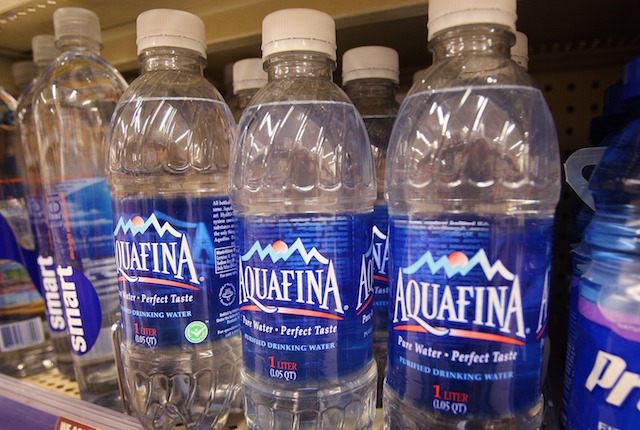As cities across the country grapple with the financial and environmental costs of plastic water bottles, an advocacy group has determined that big business is intentionally targeting communities of color to purchase what is often filtered tap water—while encouraging politicians to put less funding into improving the safety of local drinking water.
In a new report, Take Back the Tap: The Big Business Hustle of Bottled Water, nonprofit Food & Water Watch examines the increase in bottled water sales and its impact on people and the environment. It specifically focuses on the role that the biggest bottled water companies—Nestlé, Niagra, Coca-Cola (Dasani) and Pepsi (Aquafina)—play. From an emailed statement about the report:
“While Nestlé and other bottlers are profiting off of our public water supplies, critical water infrastructure problems are worsening,” said Wenonah Hauter, executive director of Food & Water Watch. “Nestlé is extracting water in Michigan cheaply to sell pricey bottled water, while Flint and Detroit residents suffer high water service fees. These water barons not only prey on distrust of tap water, but they also help reinforce that distrust through lobbying to enact policies to keep the bottled water profits flowing. Meanwhile, residents in Martin County, Kentucky, a poor community with a catastrophically failing water system, could soon see their water rates increase nearly 50 percent, even though many residents depend on pricey bottled water because of concerns about the safety of their tap water.”
The report notes how the bottled water market (where nearly 64 percent of the water sold is municipal tap water that has been filtered) has greater growth than the U.S. soft drink industry. From 2011 to 2016, it grew by 39 percent, from 9.2 to 12.8 billion gallons. In comparison, soft drinks’ market share increased by 8 percent.
The cost of a gallon of tap water is, on national average, $0.05—the price for a gallon’s worth of single serve bottled water jumps to $9.47. The report posits that the bottled water industry markets to communities who fear the safety of tap water, consequently justifying the comparatively higher cost with the promise of health and safety.
“Bottled water advertising targets people of color, women, mothers, children and lower-income groups. Industry marketing strategies designed to promote the safety of bottled water to people who historically lack access to safe tap water (especially recent immigrants) prey upon those who may mistrust tap water and communities concerned about obesity and sugary beverages,” the report states. Additionally, in 2014, Nestlé spent over $5 million advertising Pure Life, making it the most advertised water brand, with three quarters of that amount ($3.8 million) going to Spanish-language television advertising.
There are also many environmental concerns surrounding bottled water, according to Food & Water Watch. Of the total number of plastic water bottles purchased in 2015, approximately 70 percent were not recycled and ended up in oceans and surface water. Properly disposing of the bottles costs local governments more than $100 million per year, says the report. In addition, “Nestlé pumped California water during the recent historic drought, withdrawing 705 million gallons of water annually—enough to supply nearly 2,200 families per year.”
The report includes several recommendations for the public and politicians:
The report recommends people choose tap over bottled water, and advocates for water management under the public trust doctrine as a common resource. It also recommends that Congress pass the Water Affordability, Transparency Equity and Reliability Act (WATER Act), which would dedicate federal funding to our drinking water and wastewater infrastructure.
“We need to kick our bottled water habit—but we also need to adequately fund our water infrastructure so that everyone has clean, safe and affordable tap water,” says Hauter. “Congress must ensure that our water infrastructure is adequately funded to protect current and future generations’ human right to water in the U.S.”
